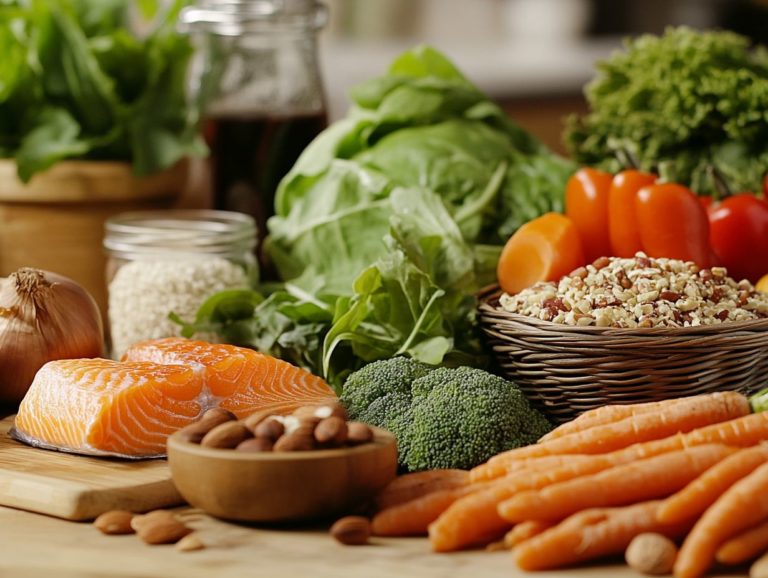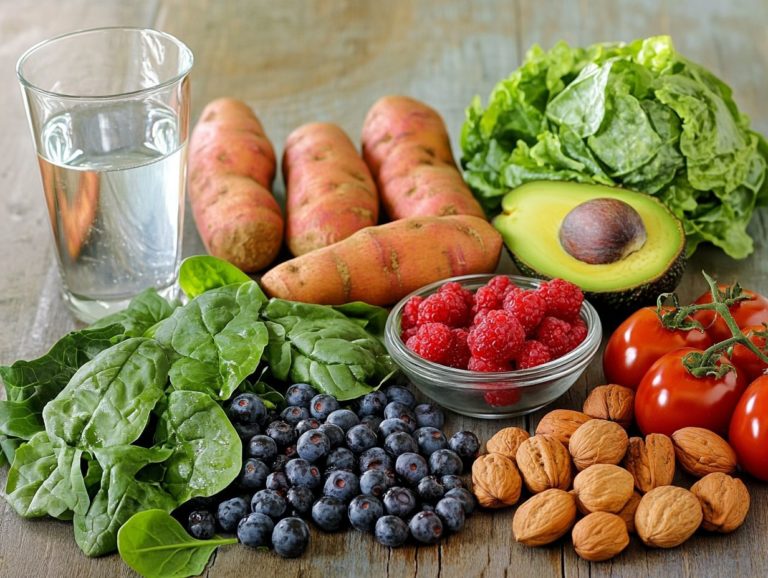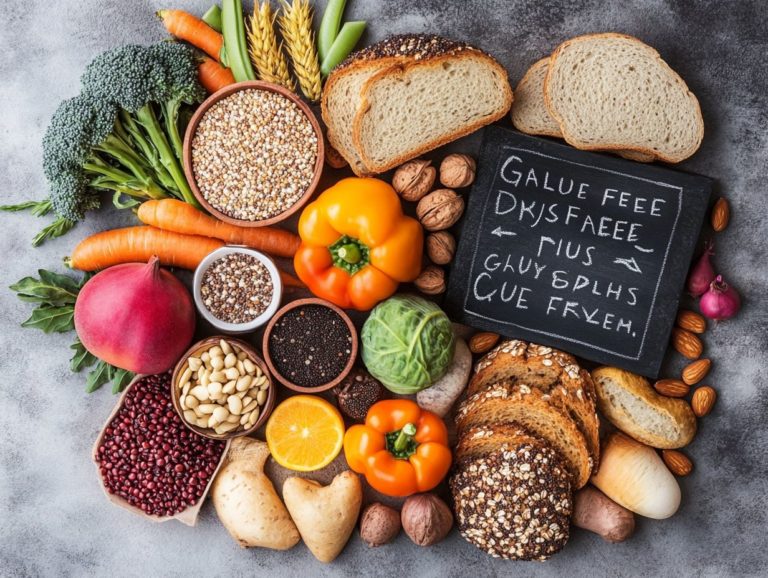Nutrition for Heart Health: Essential Foods
Heart health is vital for your overall well-being, and nutrition plays a significant role in that equation. The foods you choose to consume directly affect your heart s function, longevity, and ability to resist disease.
This article focuses on the nutrients that support heart health. You ll learn about vitamins, healthy fats, and proteins that make a difference.
You will explore how exercise and stress management enhance your heart health. Join us on an exciting journey to better heart health! Make informed nutrition choices today for a healthier tomorrow!
Contents
Key Takeaways:
- A balanced diet rich in essential nutrients is crucial for maintaining heart health.
- Incorporating a variety of heart-healthy foods like fruits, vegetables, whole grains, and lean proteins can help protect against heart disease.
- Regular exercise and stress management are important for maintaining a healthy heart.
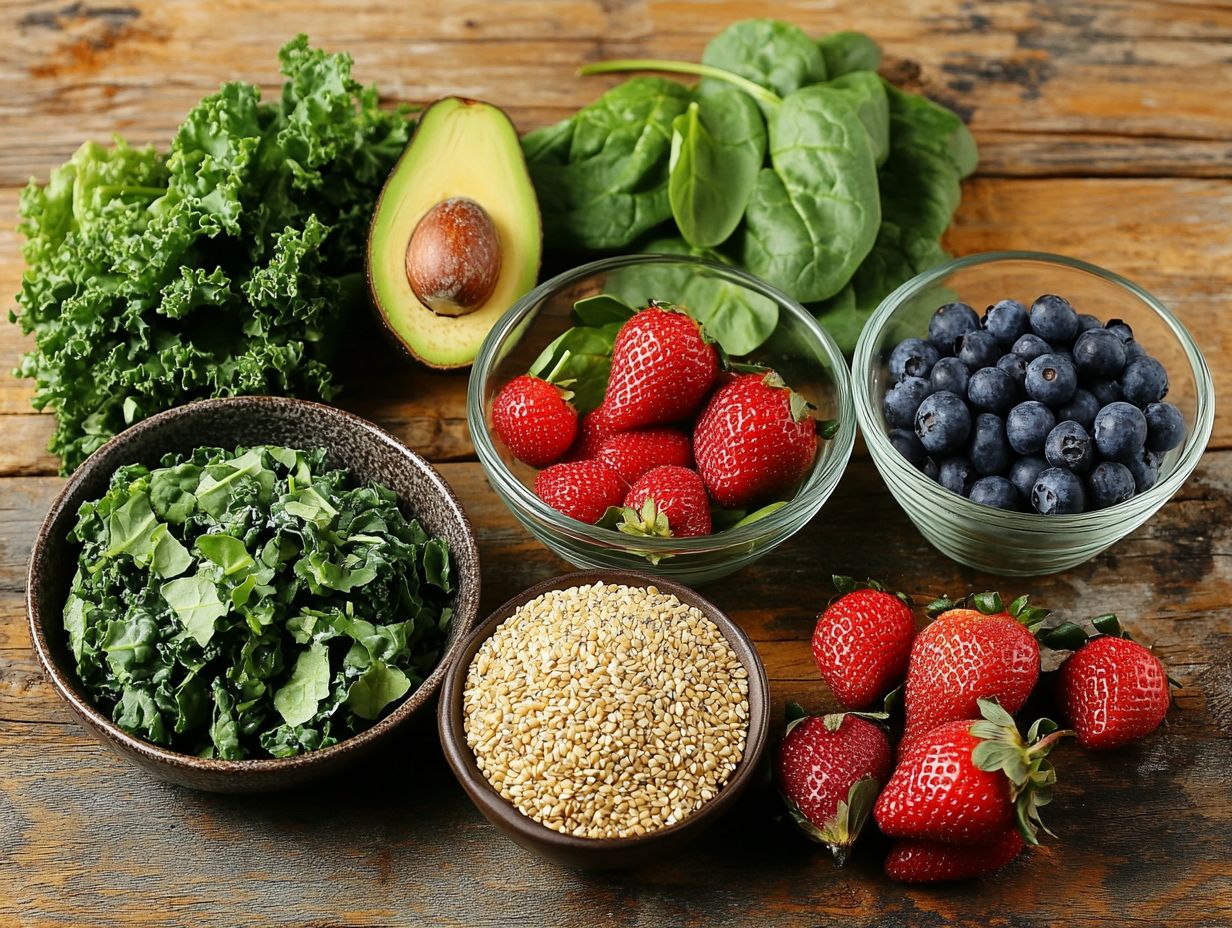
Why Nutrition is Important for Heart Health
Nutrition is essential for maintaining heart health, especially when it comes to reducing the risk of heart disease that impacts millions around the globe. By embracing a heart-healthy diet that focuses on nutrient-rich foods, such as the top 10 superfoods for a healthy heart, you can positively impact your blood pressure, cholesterol levels, and overall cardiovascular wellness. Renowned organizations like the Mayo Clinic and the American Heart Association emphasize that understanding dietary guidelines and making informed choices about your eating habits can greatly enhance your heart health and overall well-being.
A heart-healthy diet typically includes a colorful array of fruits and vegetables, whole grains, lean proteins, and healthy fats. For instance, incorporating foods like salmon, nuts, and avocados into your meals provides you with omega-3 fatty acids, which are healthy fats that promote heart function. On the flip side, saturated and trans fats found in processed foods and fatty meats can elevate cholesterol levels and increase your risk of heart disease.
It s also vital to pay attention to portion sizes; overindulging even in healthy foods can lead to weight gain and negatively impact your heart health. By prioritizing balanced meals and making thoughtful food choices, you can take significant steps toward protecting your cardiovascular system.
Essential Nutrients for a Healthy Heart
To maintain optimal heart health, it s crucial for you to include various essential nutrients in your diet. A well-rounded, heart-healthy eating plan should encompass a balance of vitamins, minerals, omega-3 fatty acids, and antioxidants, all of which significantly contribute to improved cardiovascular health.
By incorporating fiber-rich foods, healthy fats, and high-quality protein sources particularly those derived from plant-based options into your daily meals, you can effectively reduce your risk of heart disease and enhance your overall well-being.
Vitamins and Minerals for Heart Health
Vitamins and minerals are essential elements of a heart-healthy diet, providing vital support for your cardiovascular function. Certain vitamins like the B vitamins, vitamin C, and vitamin E as well as important minerals such as potassium and magnesium, play significant roles in maintaining your heart health. Antioxidants, found in delicious foods like dark chocolate and garlic, help reduce oxidative stress and inflammation! They further contribute to your cardiovascular well-being.
Take B vitamins, for instance. Folate and B6 work wonders by helping to lower homocysteine levels a substance in the blood that can indicate heart disease risk. You can find these in leafy greens, beans, and whole grains, all excellent sources. Vitamin C, abundant in citrus fruits and berries, not only supports your immune system but also aids in repairing blood vessels.
Don’t overlook potassium-rich foods like bananas and sweet potatoes; they help regulate blood pressure, which is crucial for preventing heart disease.
Magnesium is another key player! It promotes healthy heart rhythms and you can find it in nuts, seeds, and whole grains. The antioxidants from various natural sources reduce inflammation, enhancing your longevity and overall cardiovascular health. Embracing these nutrients can significantly elevate your heart’s vitality.
Healthy Fats and Proteins
Incorporating healthy fats and high-quality protein sources is essential for your heart-healthy eating plan! By including these nutrients, you not only support your cardiovascular health but also enhance your overall well-being. For instance, omega-3 fatty acids found in foods like salmon and chia seeds reduce inflammation and promote brain health.
Conversely, unhealthy fats especially those lurking in fried foods and certain baked goods raise cholesterol levels and increase the risk of chronic diseases. Rather than reaching for butter, choose olive oil or avocado. Both are fantastic sources of heart-healthy fats.
Swapping out red meat for poultry or plant-based proteins elevates your balanced diet! It leads to better health outcomes while still allowing you to savor delicious meals.
Heart-Healthy Foods to Incorporate
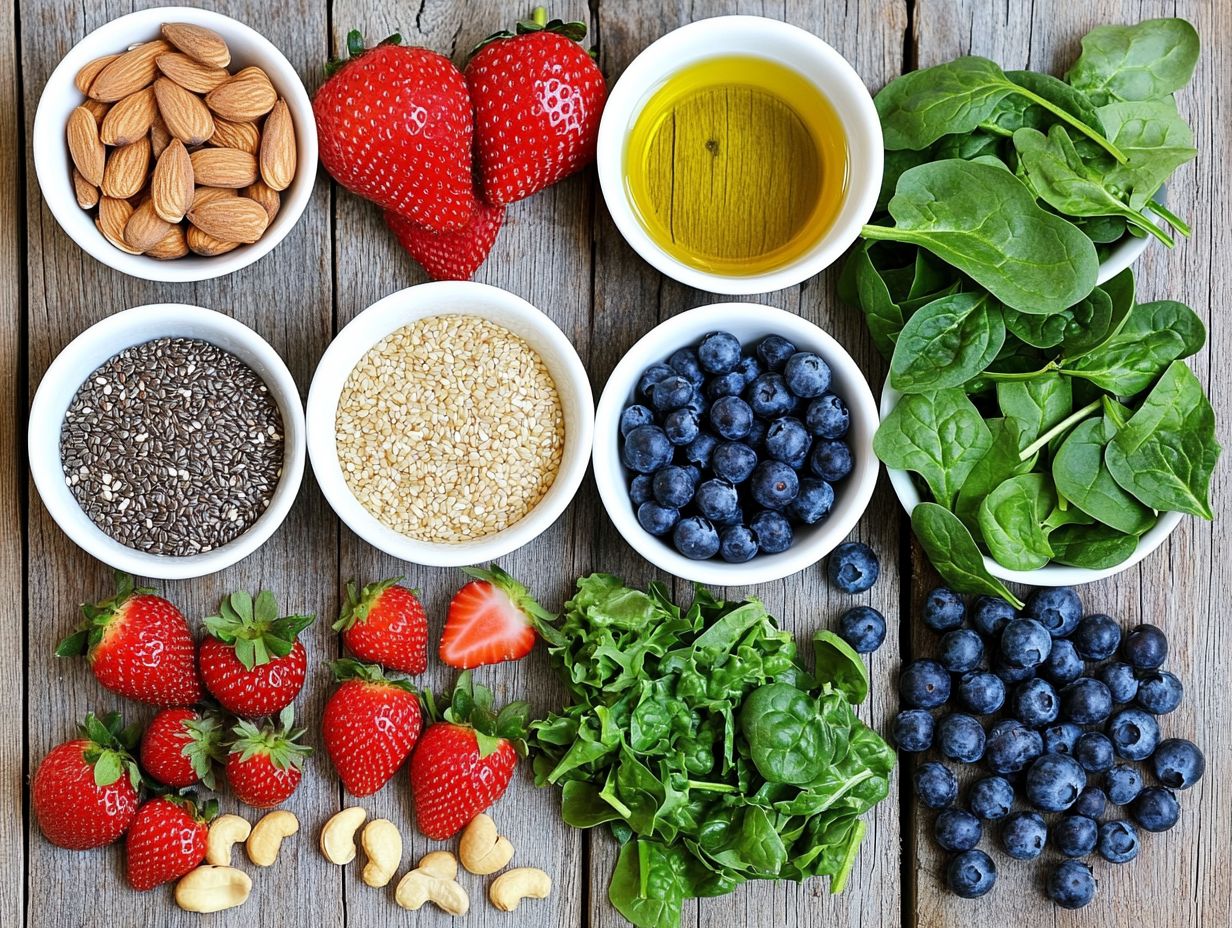
Incorporating a diverse array of heart-healthy foods into your diet is essential for helping your heart and thwarting the onset of heart disease. A well-balanced diet, abundant in fruits, vegetables, whole grains, and legumes, guarantees that you receive the vital nutrients your body craves while minimizing unhealthy fats and added sugars.
Including lean proteins and thoughtfully planning your snacks can help you maintain appropriate portion sizes and calorie intake. This mindful approach plays a significant role in nurturing long-term heart health.
Fruits and Vegetables
Fruits and vegetables are the cornerstones of a heart-healthy diet! They are brimming with antioxidants, vitamins, and fiber-rich goodness, significantly boosting your cardiovascular health. When you make fruit a regular part of your diet, you can lower blood pressure and cholesterol levels while reaping essential nutrients.
By exploring a variety of vegetable recipes, you ll find it easier to incorporate these nutrient-dense foods into your meals! This leads to overall healthier eating habits.
A diet that embraces a spectrum of colors and types of produce ensures you re getting a broad range of nutrients, each offering unique benefits for heart health. Take berries, for example; they re celebrated for their ability to reduce inflammation and enhance blood vessel function. Leafy greens, on the other hand, deliver vital vitamins and minerals that help optimize circulation.
To effortlessly weave more fruits into your daily routine, think about adding slices of banana or apple to your oatmeal or yogurt, or blending a handful of spinach into your smoothies!
Unique vegetable dishes, like roasted rainbow carrots drizzled with olive oil and lemon, not only brighten up your plate but also enhance your nutrient intake, turning every meal into a heart-healthy delight!
Whole Grains and Legumes
Whole grains and legumes are essential pillars of a heart-healthy diet! They are packed with fiber that can significantly lower your risk of heart disease and enhance your overall well-being. By swapping out refined grains for whole grains like oats, quinoa, and brown rice, you can elevate your dietary choices to new heights.
Incorporating legumes such as beans, lentils, and chickpeas not only delivers vital protein but also provides the nutrients essential for supporting how well your heart works. These foods work wonders by lowering cholesterol levels and promoting healthy digestion, making them non-negotiable in any meal plan designed to boost heart health.
To smoothly transition from refined to whole options, start by gradually blending whole grain alternatives into your favorite recipes. For breakfast, consider trading white bread for whole grain toast or savoring a bowl of oatmeal adorned with fruits and nuts.
Don’t forget to add legumes to your soups, salads, and stews; they bring both flavor and substance while enhancing your nutrient intake. By implementing these small yet impactful changes, you can cultivate a heart-friendly diet that is not only nutritious but also incredibly satisfying and delicious!
Fatty Fish and Lean Proteins
Including fatty fish and lean proteins in your diet is vital for maintaining optimal heart health. These foods are rich in omega-3 fatty acids that support your heart. Fish like salmon, mackerel, and sardines serve as excellent sources of these healthy fats. Lean proteins can be found in poultry, legumes, and various plant-based options.
Embracing healthy cooking methods helps preserve these nutritional benefits while keeping unhealthy fats at bay. For example, grilling or baking fatty fish allows the natural flavors to shine without relying on excessive oils. You might also consider adding grilled chicken or beans to a vibrant salad for a protein boost, enhancing the dish s appeal with fresh herbs and spices!
Make sure to enjoy fish at least twice a week. Consider substituting red meats with lean proteins to further bolster your heart health. Meal prepping with these nutritious options can simplify your week, making it easier for you to adhere to a heart-healthy diet.
Creating a Heart-Healthy Meal Plan
Creating a heart-healthy meal plan requires you to make intentional choices regarding food selections, portion sizes, and cooking methods. All these choices aim at fostering a balanced diet that supports your heart health. A thoughtfully structured healthy eating plan not only simplifies maintaining appropriate food portions but also encourages the intake of nutrient-dense foods!
By emphasizing heart-healthy dietary principles, you can elevate your overall well-being while significantly lowering your risk of heart disease.
Tips for Balancing Nutrients
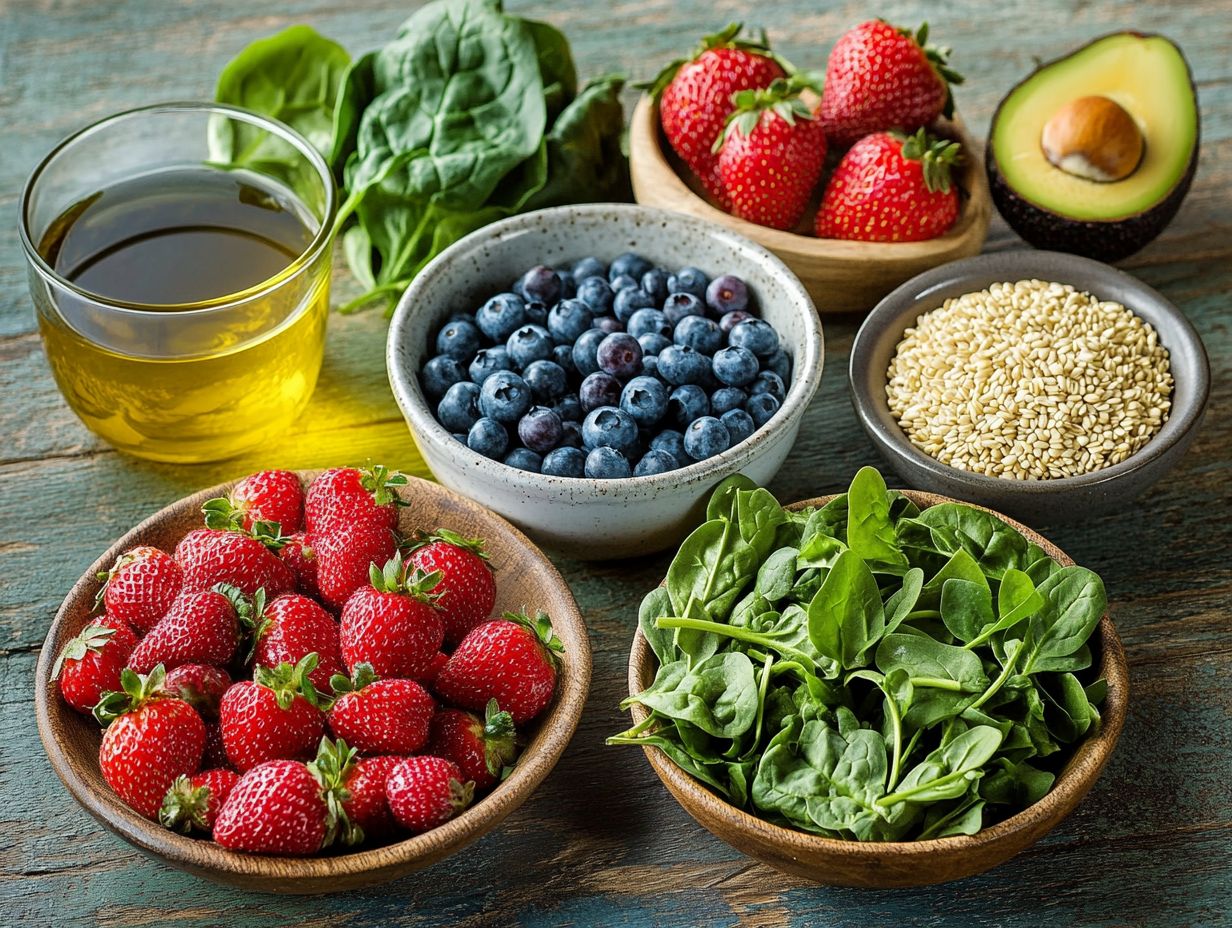
Balancing nutrients is essential for a heart-healthy diet. This allows you to consume the right amounts of healthy fats, protein sources, and fiber-rich foods while managing your sodium intake. By maintaining proper portion sizes, you can prevent excessive calorie consumption, which is vital for effective weight management and overall heart health.
To begin, consider integrating a variety of healthy fats into your daily meals think avocados, nuts, and olive oil! These not only enhance the taste of your dishes but also provide essential nutrients. Likewise, opt for lean protein sources like chicken, fish, or legumes to keep your meals both satisfying and nourishing.
Don’t forget to add fiber-rich foods such as fruits, vegetables, and whole grains; they boost digestion and help you feel fuller for longer. It’s wise to limit high-sodium ingredients, using herbs and spices to elevate flavors instead.
By crafting meals with these components in mind, you can effortlessly enjoy a balanced diet that supports your heart health. Start making these dietary changes today for a healthier heart!
Lifestyle Factors for Heart Health
Lifestyle factors play a crucial role in shaping your heart health. Embracing healthy choices greatly lowers your risk of heart disease.
By incorporating regular exercise, managing stress effectively, and making informed dietary decisions, you can lay the groundwork for a heart-healthy lifestyle.
Understanding how these elements interact enables you to cultivate habits that support long-term heart health and enhance your overall quality of life.
Exercise and Stress Management
Regular exercise and effective stress management are essential for a healthy lifestyle. They significantly boost your heart health.
Engaging in physical activity fortifies your heart, lowers blood pressure, reduces cholesterol levels, and helps manage weight. Each factor plays a pivotal role in reducing your risk of heart disease.
Incorporating stress management techniques like mindfulness and relaxation exercises can further improve your heart health.
Integrating various aerobic exercises, such as brisk walking, cycling, or swimming, will boost your heart endurance and circulation. Additionally, resistance training using weights or your body weight strengthens muscles and promotes metabolic efficiency.
Embracing practical stress management techniques like deep breathing exercises, progressive muscle relaxation, or brief meditation sessions throughout your day will help you feel calmer and more in control.
Harmonizing these elements in your daily routine can enhance your heart health for the long term.
Frequently Asked Questions
Wondering what foods can boost your heart health?
- Fruits
- Vegetables
- Whole grains
- Lean proteins
- Healthy fats
Why are fruits and vegetables important for heart health?
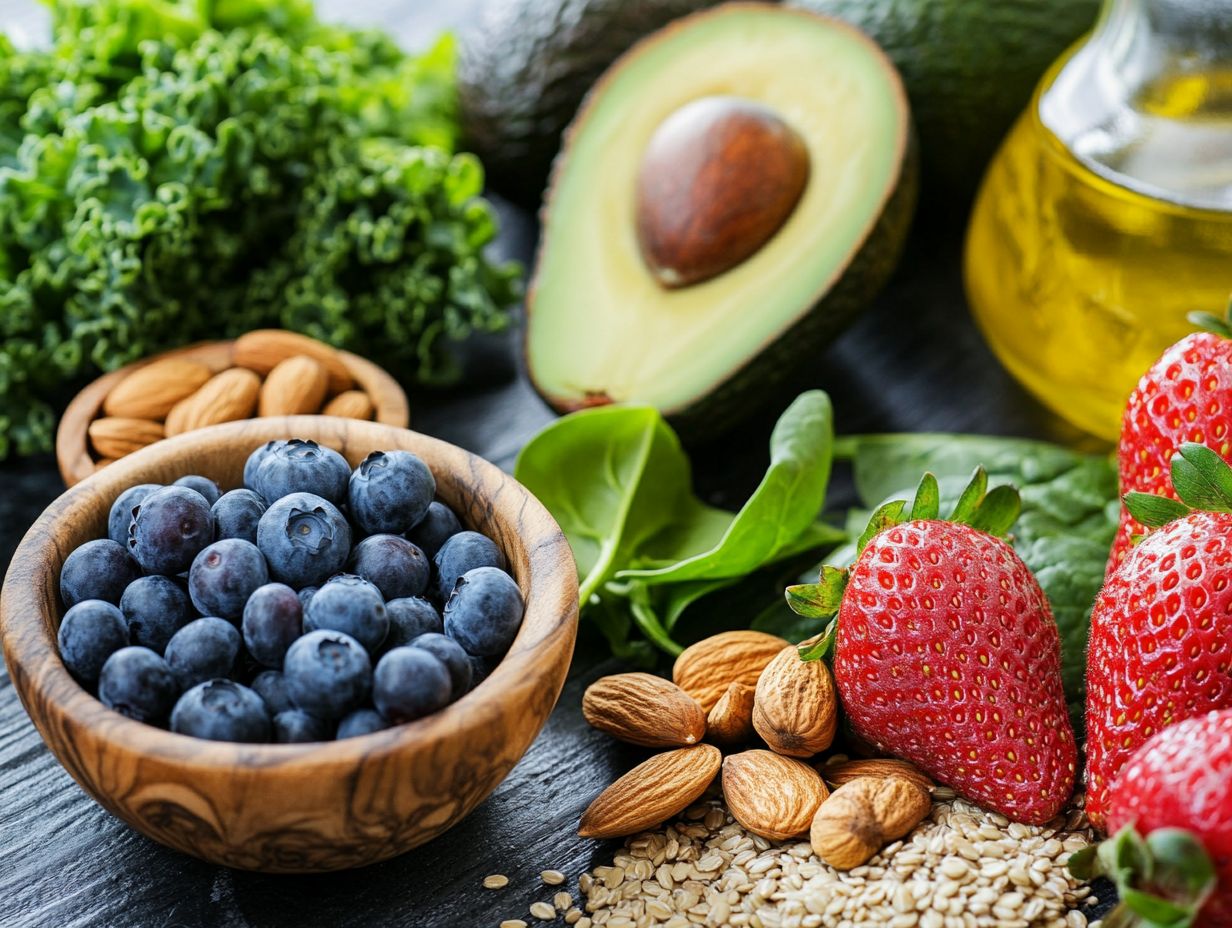
Fruits and vegetables are vital for heart health because they are rich in nutrients, antioxidants, and fiber. These components help reduce inflammation and lower the risk of heart disease.
What are some examples of heart-healthy whole grains?
- Oatmeal
- Quinoa
- Brown rice
- Whole wheat bread
- Whole grain pasta
How does lean protein benefit heart health?
Lean protein, like chicken, fish, beans, and legumes, contains important nutrients such as omega-3 fatty acids. These can help lower cholesterol and reduce the risk of heart disease.
Are all fats bad for heart health?
No, not all fats are harmful. Healthy fats, such as avocados, olive oil, nuts, and seeds, benefit heart health by improving cholesterol levels and reducing inflammation.
What should be avoided in a heart-healthy diet?
A heart-healthy diet should limit or avoid:
- Processed foods
- Excess salt and sugar
- Unhealthy fats, such as trans fats
It’s also crucial to limit alcohol consumption and quit smoking for overall heart health.
Take charge of your heart health today! Start making these changes and feel the difference.

